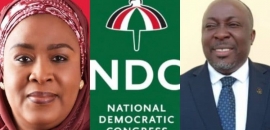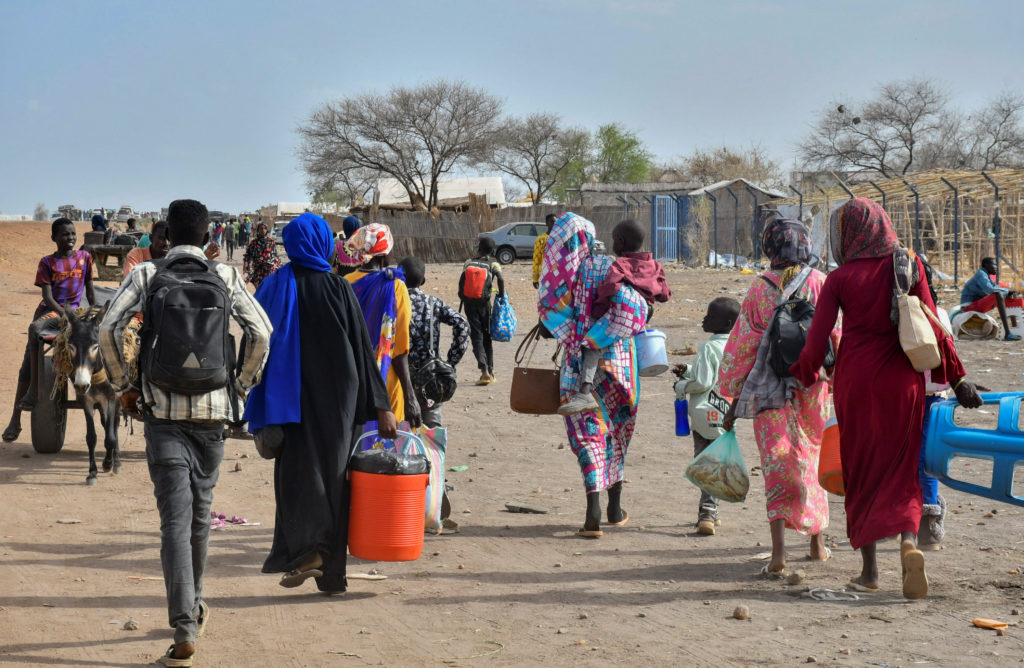
Baba Jamal, Hajia Amina Among Six in NDC Ayawaso East Race
Jan 26, 2026
by Chris Benyah Oct 20, 2025

October 20, 2025
Security has been intensified at Ghana's Elubo border crossing following an influx of over 1,500 Ivorian nationals fleeing election-related violence in Côte d'Ivoire ahead of the country's general elections scheduled for October 25, 2025.
The Western Regional Minister, Joseph Nelson, has directed security personnel stationed at the strategic border point to maintain maximum vigilance to prevent criminal elements from exploiting the humanitarian situation to infiltrate Ghana.
During a working visit to the Ghana-Ivory Coast border at Elubo on Saturday, Mr. Nelson emphasized the need for enhanced surveillance as the election date approaches and the potential for increased refugee movements grows.
"The situation is still very fluid. And so let's keep our eyes on the inflows so that we can check the security side of things, so we don't have any surprises any day in the future," the Regional Minister cautioned security officers.
He warned that the current numbers could increase significantly as Côte d'Ivoire moves closer to election day, urging border officials to prepare for a potential surge while maintaining strict security protocols.
"The elections are coming on in October, as you know, and so as we approach the day, I believe that a lot more of them will come. So put yourself in readiness to receive them, and then, of course, with your eyes wide open, so we don't get any criminals slipping through the system to pose a challenge to us as far as our security is concerned," Mr. Nelson added.
The October 25 general election in Côte d'Ivoire has been marked by rising political tensions and sporadic violence, prompting many citizens, particularly those in border communities, to seek temporary refuge in neighboring Ghana.
Côte d'Ivoire has a history of election-related violence, most notably during the 2010-2011 post-electoral crisis that claimed approximately 3,000 lives and displaced hundreds of thousands. The memory of that conflict continues to fuel anxiety among Ivorians during election periods.
The current pre-election environment has reportedly witnessed clashes between supporters of rival political camps, attacks on campaign offices, and confrontations with security forces in several regions, particularly in areas near the Ghanaian border.
Deputy Commissioner of Immigration at the Elubo Command, DCI Joshua Krakue, highlighted the operational challenges facing immigration officers in identifying individuals seeking asylum versus those engaged in regular cross-border travel.
"Rationally, people are taking precautions by leaving the country to find safe havens and then maybe after the elections, if everything is fine, they go back. But when they are coming through the border, they don't present themselves as people who are coming to seek asylum," DCI Krakue explained.
He noted that many Ivorians crossing the border appear as ordinary travelers, only revealing their asylum-seeking status after reaching refugee reception centers within Ghana.
"They are coming as normal travellers. But then they end up maybe getting to the refugee camp to seek asylum. So, we have also noticed that the numbers are going up. But there isn't a situation where people are carrying their bags to cross the border to go there," the immigration official added.
The situation at Elubo presents Ghanaian authorities with the dual challenge of providing humanitarian assistance to genuine refugees while simultaneously protecting national security interests.
Ghana has historically maintained an open-door policy toward refugees from neighboring countries, earning international recognition for its hospitality and compliance with international refugee conventions. However, security concerns, particularly regarding potential infiltration by criminal networks or extremist elements, necessitate careful screening procedures.
The Ghana Refugee Board, in collaboration with the United Nations High Commissioner for Refugees (UNHCR), operates reception centers where asylum seekers undergo registration and assessment processes to determine their eligibility for refugee status.
The Ghana-Côte d'Ivoire border stretches over 720 kilometers, with Elubo serving as one of the busiest official crossing points. The two West African neighbors maintain strong economic and social ties, with significant cross-border trade and familial connections.
The Western Region's proximity to Côte d'Ivoire makes it particularly vulnerable to spillover effects from Ivorian political instability, including refugee movements, smuggling activities, and potential security threats.
The heightened security measures at Elubo involve coordination among multiple agencies including the Ghana Immigration Service, Ghana Police Service, Military Intelligence, National Security operatives, and customs officials.
Intelligence sharing between Ghanaian and Ivorian security agencies has been enhanced to monitor developments and identify potential security threats before they materialize at the border.
The Western Regional Security Council (REGSEC) has reportedly activated contingency plans to manage increased refugee numbers, including provisions for temporary shelter, food, medical care, and security screening.
The pre-election violence in Côte d'Ivoire has raised broader concerns about political stability in West Africa, a region that has witnessed multiple coups and democratic backsliding in recent years.
The Economic Community of West African States (ECOWAS) has deployed election observers to Côte d'Ivoire and has called on all political actors to commit to peaceful elections and acceptance of results.
Ghana, which successfully conducted its own general elections in 2024, has been positioned as a beacon of democratic stability in the sub-region, making it an attractive safe haven for those fleeing political violence in neighboring countries.
Authorities in the Western Region have assured the public that adequate measures are in place to handle the influx while maintaining security and public order.
Local government officials have been directed to work with traditional authorities and community leaders to monitor the presence of new arrivals and report suspicious activities to security agencies.
The Ghana Health Service has also been placed on alert to provide medical screening and care for refugees, particularly in light of communicable disease concerns.
As Côte d'Ivoire approaches its October 25 election date, Ghanaian authorities remain on high alert for potential increases in refugee movements and associated security challenges.
The success of security operations at Elubo and other border crossings will depend on sustained vigilance, effective inter-agency coordination, and balanced approaches that honor Ghana's humanitarian commitments while safeguarding national security.
Regional Minister Joseph Nelson has pledged to continue monitoring the situation closely and provide necessary support to security agencies to ensure the border remains secure while accommodating legitimate humanitarian needs.
The international community continues to watch developments in Côte d'Ivoire, hoping that the October 25 elections will be conducted peacefully, allowing displaced Ivorians to return home and reducing pressure on neighboring countries.

Jan 26, 2026

Feb 19, 2025

Feb 28, 2025

Jan 18, 2026

Jan 30, 2026

Mar 20, 2025

Jan 30, 2026

Mar 31, 2025